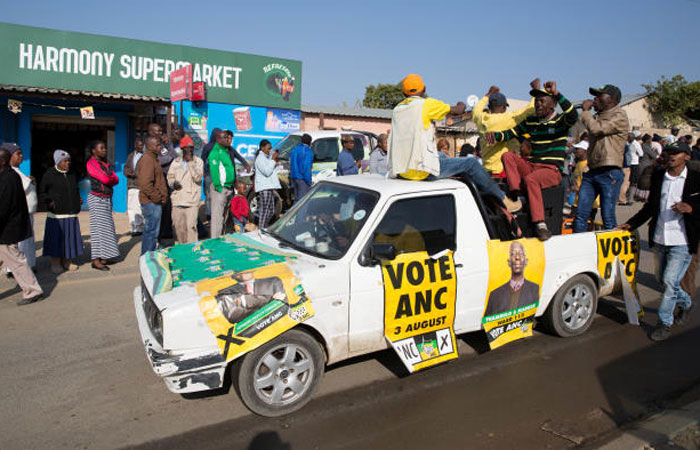-
Tips for becoming a good boxer - November 6, 2020
-
7 expert tips for making your hens night a memorable one - November 6, 2020
-
5 reasons to host your Christmas party on a cruise boat - November 6, 2020
-
What to do when you’re charged with a crime - November 6, 2020
-
Should you get one or multiple dogs? Here’s all you need to know - November 3, 2020
-
A Guide: How to Build Your Very Own Magic Mirror - February 14, 2019
-
Our Top Inspirational Baseball Stars - November 24, 2018
-
Five Tech Tools That Will Help You Turn Your Blog into a Business - November 24, 2018
-
How to Indulge on Vacation without Expanding Your Waist - November 9, 2018
-
5 Strategies for Businesses to Appeal to Today’s Increasingly Mobile-Crazed Customers - November 9, 2018
South Africa’s ANC suffers major setback in civic polls
African National Congress (ANC) and South African Communist Party (SACP) supporters dance and sing in celebration at Wembezi township near Estcourt some 215 kilometres west of Durban.
Advertisement
The local election is also a mid-term reflection on the performance of President Jacob Zuma, who has been plagued by economic woes and a series of scandals since taking office in 2009.
The municipal vote comes as Africa’s most industrialised country teeters on the edge of a recession after a string of corruption scandals surrounding Zuma. “It’s a nightmare come true for the ANC and Jacob Zuma”, said Daryl Glaser, head of political studies at Johannesburg’s Witwatersrand University.
In a statement on Thursday, the ANC insisted it was “buoyant and energized” because it had avoided the “doomsday predictions” of many pollsters and commentators.
Meanwhile, South Africans were on Friday waiting anxiously for the final results of the fifth local government polls since the country gained majority rule in 1994.
The DA, which a year ago elected its first black leader Mmusi Maimane, was ahead in Johannesburg and in Nelson Mandela Bay, the area named after the anti-apartheid hero who led the ANC to power and which includes the city of Port Elizabeth.
“We know it’s a tight race but I can assure you that we will emerge victorious in Tshwane (Pretoria), we will emerge victorious in Johannesburg”, he added.
Even if the ANC maintains its hold on power through inter-party alliances, any overall drop in support would be a loss, say analysts.
“We are not opposed to coalitions except with the governing party”.
The ANC and DA are on 41.84 percent and 41.72 percent of the vote respectively in Johannesburg, with the EFF on 10.81 percent; and 41.91 percent 43.49 percent in Pretoria, with the EFF on 10.57 percent. The Economic Freedom Fighters stood at 8 percent.
The Democratic Alliance was also ahead in Nelson Mandela Bay, a major municipality on the east coast. The DA looked likely to take control of Port Elizabeth, a key industrial hub on the country’s southern coast and capital of the Eastern Cape, the traditional heartland of the ANC.
The ruling party garnered 44 percent.
S&P Global Ratings and Fitch Ratings both have South Africa’s foreign debt rating at one notch above “junk” status, citing concerns about economic growth, reliable energy, labor reform and mining legislation. But its worst-ever showing signals a watershed moment in the country’s history, especially for an impoverished black majority that is clearly growing disillusioned with the party of Nelson Mandela.
Mr Maimane said that the true test of South Africa’s young democracy would be the response of its political leaders and their followers in the coming days as the results are confirmed. “And so, it’s quite an exciting election now, and, at preliminary stages, we’re still feeling good and feeling strong”.
“We are comfortable with the early lead”, Gwede Mantashe, the ANC’s secretary-general told broadcaster 567 Cape Talk.
Advertisement
With 13.7 million, or about 90 percent of the estimate of proportional representation votes cast nationally in the election counted as of 12:20 p.m. on Friday, the ANC had 55 percent of the total support, followed by the DA with 26.4 percent, according to the commission.





























